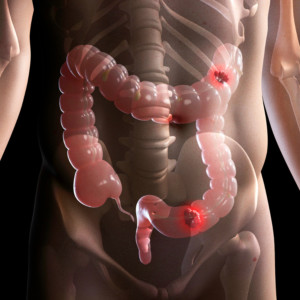Tri-City Medical Center recognizes the significance of March as National Colorectal Cancer Awareness Month. Learning about any disease that takes many lives is difficult, but the fact is that early detection through education and screening is proven to dramatically reduce fatalities from colorectal cancer.
What is Colon Cancer?

Screening is one of the most powerful weapons we have in the fight against cancer. When caught early, colorectal cancer — like many other cancers — is much easier to treat and recover from.
Colon cancer is a malignant growth or tumor in the colon or rectum. Colorectal cancer is the third leading cause of cancer deaths for both men and women in the United States. Colorectal cancer can be both curable and preventable if detected early and completely removed before the cancerous cells spread to other parts of the body.
Who is at risk?
Certain lifestyle factors are known to increase the risk of colorectal cancer which include being overweight/obesity, excessive alcohol use, smoking cigarettes, a diet low in fiber, a diet high in red meat, as well as a sedentary lifestyle. A family history of colon cancer, inflammatory bowel disease, certain colon polyps and genetic syndromes like familial adenomatous polyposis or hereditary non-polyposis increase the risk of colorectal cancer.
Decreasing the Risk
Fortunately, there are a few things that can be done to decrease the chance of developing colon cancer. Most colorectal cancers come from colorectal polyps. Even though colorectal polyps are initially benign, they can grow and change into colorectal cancers over a period of time, ranging from five to twenty years. This is where early screening and identification are keys to prevention, or a better prognosis if caught early.
The best tools for both prevention and early detection of colorectal cancers are the colonoscopy and flexible sigmoidoscopy, along with digital rectal examination and stool occult blood testing. New studies have shown that younger adults are getting colon cancer at earlier ages. New colonoscopy screening guidelines now recommend having a colonoscopy beginning at age 45, rather than the previously recommended age of 50, with the goal of saving more lives with early detection. For those with higher risk factors, your physician will be able to determine an appropriate age to begin screening. In this increasingly busy world, it is important to remember to take care of yourself. Health is the greatest wealth you possess.

About the Author
Dr. Hussna Wakily is an award-winning, board-certified general surgeon who takes care of all issues related to the colon and rectum, including hemorrhoids. Recently voted as Top Doctor in 2019 and 2020
for general and breast surgery.
To learn more about Dr. Wakily or make an appointment, call 855.222.8262.





